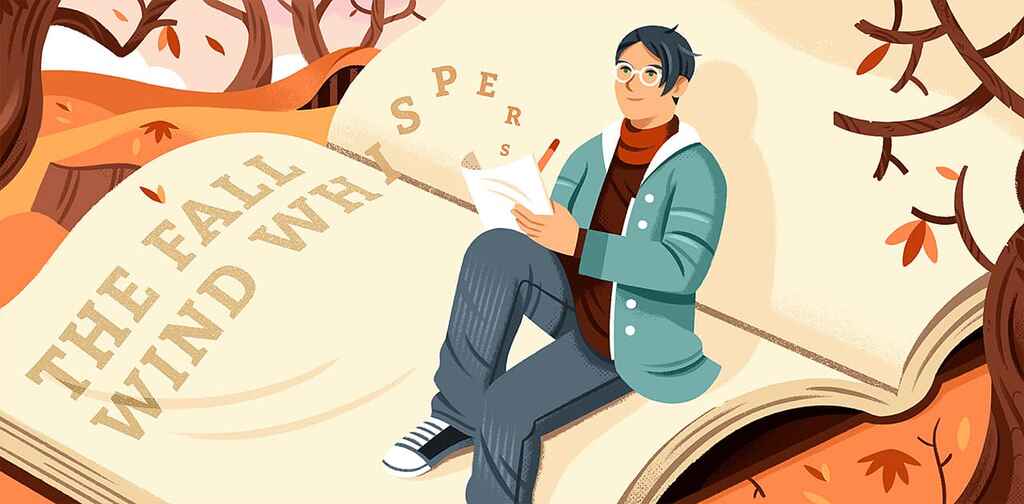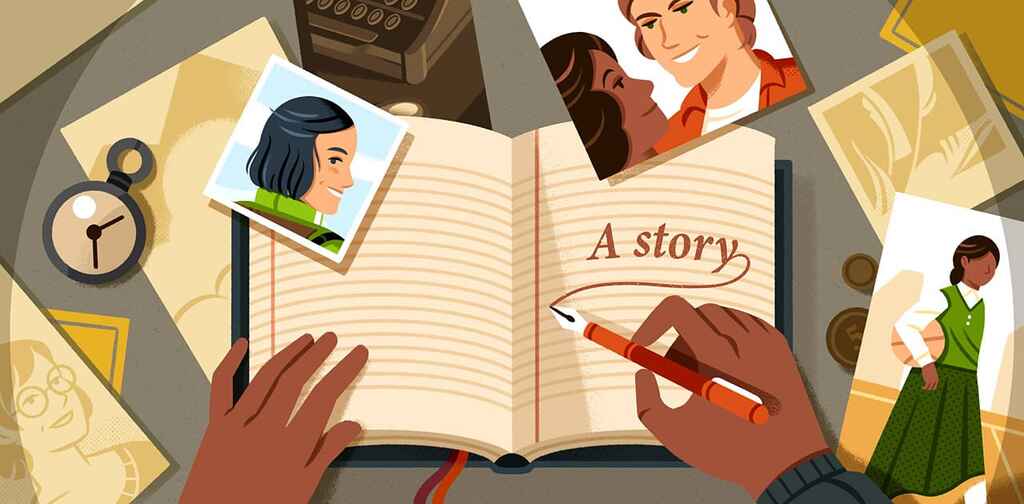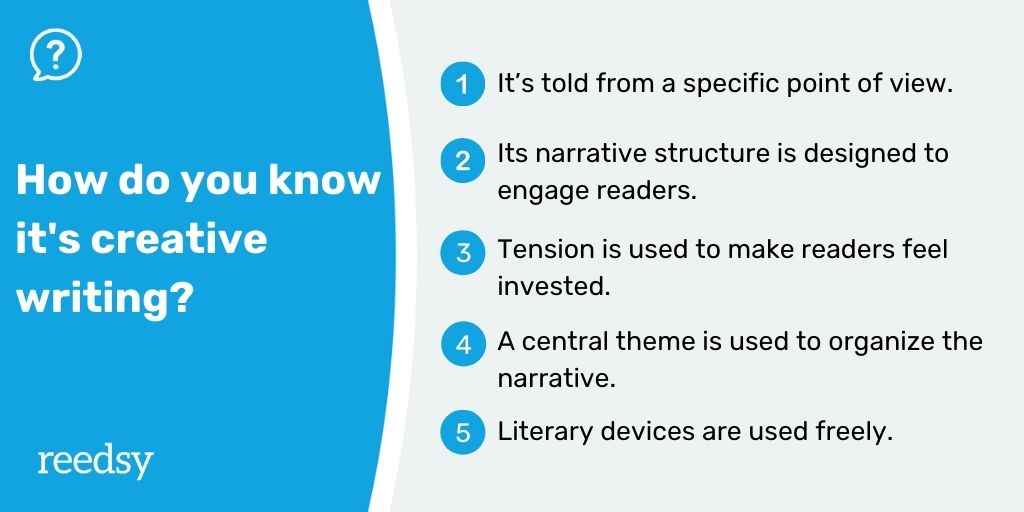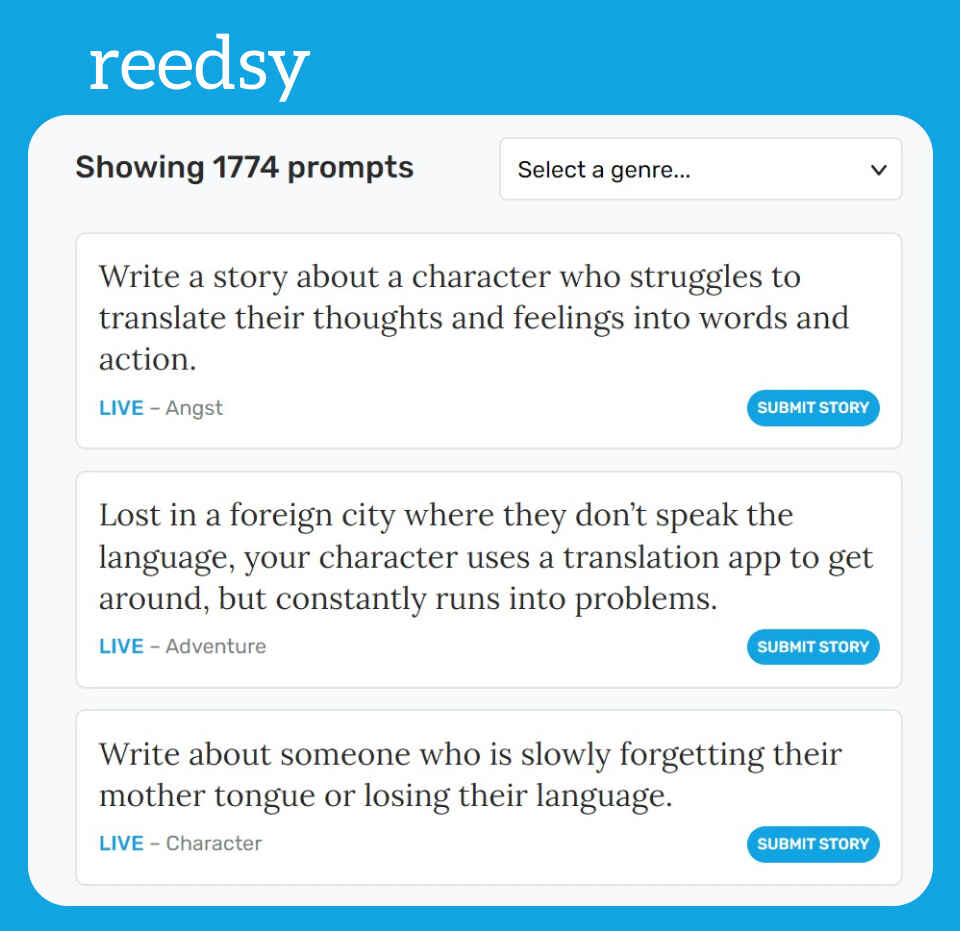Guides • Perfecting your Craft
Last updated on Oct 15, 2025
Creative Writing: 8 Fun Ways to Get Started
Savannah Cordova
Savannah is a senior editor with Reedsy and a published writer whose work has appeared on Slate, Kirkus, and BookTrib. Her short fiction has appeared in the Owl Canyon Press anthology, "No Bars and a Dead Battery".
View profile →Creative writing is a written art form that uses the imagination to tell stories and compose essays, poetry, screenplays, novels, lyrics, and more. It can be defined in opposition to the dry and factual types of writing found in academic, technical, or journalistic texts.
Characterized by its ability to evoke emotion and engage readers, creative writing can tackle themes and ideas that one might struggle to discuss in cold, factual terms.
If you’re interested in the world of creative writing, we have eight fantastic exercises and activities to get you started.
1. Use writing prompts every week

Coming up with ideas for short stories can be challenging, which is why we created a directory of 1700+ creative writing prompts covering a wide range of genres and topics. Writing prompts are flexible in nature, they are meant to inspire you without being too constrictive. Overall, they are a great way to keep your creative muscles limber.
If you’re struggling for motivation, how does a hard deadline and a little prize money sound? Prompts-based writing contests are a fantastic way to dive into creative writing: the combination of due dates, friendly rivalries, prize money, and the potential to have your work published is often just what’s needed to propel you over the finish line.
Q: What are the most important habits for new writers to develop?
Suggested answer
You want to become a habit writer. That means writing daily or having set times each week set apart for writing and then keeping that appointment with yourself to write during that time, barring an emergency. One way to do this is to set a special area to write where you cannot be disturbed, go to a coffee shop or library to write, or write with a buddy in your critique group so you can both motivate each other to keep going. NaNoWriMo [National Novel Writing Month] is a great group to join during November for this sort of group motivation.
You also want to continue reading books in your genre and continue learning how strong writers write.
Getting used to receiving feedback is also a good idea. If possible, join a writing club or critique group in your area or online. Attend writing workshops at your local libraries. We all have strengths and weaknesses, and receiving feedback from peers and editors will help us to realize what these are, so we can keep improving.
Melody is available to hire on Reedsy ⏺
We run a weekly writing contest over on Reedsy Prompts, where hundreds of writers from all around the world challenge themselves weekly to write a short story between 1,000 and 3,000 words for a chance to win the $250 prize. Furthermore, the community is very active in providing constructive feedback, support, and accountability to each other 一 something that will make your efforts even more worthwhile.
Take a peek at our directory of writing contests which features some of the most prestigious open writing competitions in the world.
2. Start journaling your days

Another easy way to get started with creative writing is to keep a journal. We’re not talking about an hour-by-hour account of your day, but journaling as a way to express yourself without filters and find your ‘voice in writing’. If you’re unsure what to journal about, think of any daily experiences that have had an impact on you, such as…
Special moments. Did you lock yourself out of your house? Or did you catch a beautiful sunset on your way back from groceries? Capture those moments, and how you felt about them.
People. Did you have an unusual exchange with a stranger at the bar? Or did you reconnect with someone you haven’t seen in years? Share your thoughts about it.
World events. Is there something happening in the world right now that is triggering you? That’s understandable. You can reflect on it (and let some steam off) while journaling.
Q: What is the single most important piece of advice for first-time novelists?
Suggested answer
Write the story you want to write, need to write--and want to read. Don't think about or worry about market trends, or how you will position your book on the market, or writing a book that will blow up on BookTok. A novel is a marathon, and in order to see it all the way through, you have to love your story (you can dislike some of your own characters of course, but you need to be deeply passionate about the overall story you are telling). In practical terms, by the time you write, revise, and publish your novel, it's likely that overall publishing trends will have shifted anyway. Write the book you want to write--things like what readers want, what publishers want, what agents want, can come later!
Kristen is available to hire on Reedsy ⏺
Read many books in your genre and look for why you like that particular book or don't like it. Get a feel for what works and what doesn't. Try to read books that sold well and were published in the last 5-10 years. Publishing norms change and styles change with time.
For instance, in the past, much time was spent setting up the story, and many opening paragraphs may have been spent describing the scenery and visual elements. While those elements are still important, modern books move at a much faster pace and spend less time on these elements by using sentences of description woven into the narrative rather than information dumps and blocks of long description that can slow the pace.
So, reading current books in your genre is the best way to learn writing methods yourself.
Melody is available to hire on Reedsy ⏺
Memories. Did you go down memory lane after a glass of wine? Great, honor those memories by trying to recollect them in detail on paper so that they will always stay vivid in your mind.
Life decisions. Are you having an existential crisis about what to do with your life? Write down your thought process, and the pros and cons of the possible decisions in front of you. You’ll be surprised to discover that, not only is it a great creative writing exercise, but it can also actually help you sort your life out!
If you struggle to write consistently, sign up for our How to Write a Novel course to finish a novel in just 3 months.

NEW REEDSY COURSE
How to Write a Novel
Enroll in our course and become an author in three months.
3. Create an anonymous social media account

Like anonymous blogging, an incognito Twitter account sidesteps the pressure that comes with attaching your name to your work. Anonymously putting tiny stories out into the ether gives you the freedom to create without worrying about the consequences — which is great, so long as you don’t use it as an opportunity to troll people or spread conspiracy theories.
You could use the anonymous account in different ways. For example, you could…
- Tweet from unique perspectives (e.g. a dog observing human behavior);
- Create a parody account of real or fictional people (e.g. an English poet from the Middle Ages);
- Challenge yourself to write tiny flash fiction stories that fit into Twitter threads.
Just remember, you’re not doing this to fool anyone into thinking that your account is real: be a good citizen and mark yourself a fiction account in your bio.

But if you’re not really a social media kinda person, you may enjoy our next tip, which is a bit more on the analog side.
Struggling with your craft? Hire a book coach
Erin D.
Available to hire
20+ years of experience guiding picture book, middle grade, and YA authors. I'm a professor, author, and your creative cheerleader.
Britny P.
Available to hire
Britny (she/they) is a YA fiction and pop culture non-fiction editor with over 7 years of traditional publishing experience.
Lara A.
Available to hire
A consummate professional with over 20 years experience in the publishing industry, specializing in genre fiction and pop culture.
4. Find an old photo and tell its story

Find a random old photo — maybe on the web, maybe from a photo album in a yard sale — and see what catches your attention. Look closely at it and try to imagine the story behind it. What was happening? Who are the people in it and how are they really feeling? Do they share a relationship, and of what kind? What are their goals and dreams?
Q: Should I follow current trends or write the story I’m most passionate about?
Suggested answer
If you write a book inspired by 2025 trends you might find that by the time it's ready for submission and even publication the trend has moved on to something new. It takes a long time to write a book: you have a better chance of sustaining momentum and enthusiasm if you stick to your passion project. I rather believe that readers pick up on that passion too.
Susanna is available to hire on Reedsy ⏺
The issue with following current trends is that the trend may be over before you get your book completed and out to the world. If you write what you are passionate about, the story will usually end up being stronger because you are writing a story that means a lot to you, as opposed to writing something just because you think it might sell.
However, you want to be sure the story you are passionate about still has a strong possibility of selling by avoiding cliches and plots that have been overworked and overdone.
Strong stories that readers can relate to will have a good chance of finding an audience no matter the genre.
Melody is available to hire on Reedsy ⏺
In other words, bring the photo to life with your imagination. Don't be afraid to take artistic license with your story, as the goal is to be creative and have fun while writing.
How do you know it’s creative writing?

5. Create a character from a random name

Just as our universe started from a few simple elements, you can create a character from a few basic information, like their name, culture, and gender. Reedsy’s handy character name generator can help you with that, offering random names based on archetypes, Medieval roots, fantasy traits and more. A few examples? A Celtic heroine named Fíona O'Keefe, a hero’s sidekick named Aderine, or a Korean track star named Park Kang-Dae.
Once you've chosen their name, begin to develop their personality. Set a timer for 5–10 minutes and write anything that comes to mind about them. It could be a page from their FBI dossier, a childhood diary entry, or simply a scene about them boiling an egg.
Just ‘go with the flow’ and don’t stop writing until your time is up. Repeat the process a few times to further hone the personality. If you like what you end up with, you can always go deeper later by creating a character bible.
Q: What tools or techniques can authors use to develop detailed and effective character profiles?
Suggested answer
Writers can establish good character profiles by examining surface information and interior depth. Beyond physical description, notice personality, values, and contradictions—what the character wants vs. what the character fears. Techniques like freewriting as a character or writing the character's background can elicit subtleties that don't find their way into the main action but still affect behavior. Some authors use Q&A-type questions to explore motivations, habits, and relationships, and other authors create images of the character's past to observe how it affects present decisions. What is most important is consistency: when you know how your character thinks and behaves, their actions make sense, and readers feel that they are interacting with real people and not with plot devices.
John is available to hire on Reedsy ⏺
This is so important because the character will drive your story.. You reader has to be fascinated by your protagonist and be routing for him or her. I always interview my characters in depth. I don't just ask them about the basics of their lives and history. I ask them what they fear most in life, what makes them get up in the morning.
Joie is available to hire on Reedsy ⏺
I provide all my clients with a template that I devised myself for ensuring that every single character in a novel is fully fleshed-out, colourful and contrasting, both within themselves and to other characters.
Vanessa is available to hire on Reedsy ⏺
I've had success doing Enneagram quizzes in each character's persona. Even if you don't believe in personality profiles, it's a good way to check whether a character's goals, motivations, and considerations are consistent. They can reveal gaps where you still have a question to answer about a character's background and, best of all, it reassures you that you're writing characters who contrast with one another, rather than representing different aspects of your temperament as the writer.
Mairi is available to hire on Reedsy ⏺
The most important issue for each character is what they want. Desire and wants fuel the story, especially regarding what the main character wants. When two characters want the same thing, this is when tension can arise organically.
Melody is available to hire on Reedsy ⏺
If a stream-of-consciousness exercise is not your thing, you can try to imagine your character in a specific situation and write down how’d they respond to it. For example, what if they were betrayed by a friend? Or if they were elected in power? To help you imagine situations to put your character in, we made a free template that you can download below.

FREE RESOURCE
Reedsy’s Character Questionnaire
40 questions to help you develop memorable characters.
6. Construct a character by people-watching

People watching is “the action of spending time idly observing people in a public place.” In a non-creepy way, ideally. Sit on a bench on a public square or on a road-side table at your favorite café, and start observing the people around you. Pay attention to any interesting quirks or behaviors, and write it down. Then put on your detective’s hat and try to figure out what that tells you about them.
For example, the man at the table next to you at the restaurant is reading the newspaper. His jacket and hat are neatly arranged next to him. The pages make a whipping sound as he briskly turns them, and he grimaces every time he reads a new article. Try to imagine what he’s reading, and why he’s reacting the way he is. Then, try to build a character with the information you have. It’s a fun creative exercise that will also, hopefully, help you better empathize with strangers.
7. “Map” something you feel strongly about into a new context

Placing your feelings into new contexts can be a powerful creative writing exercise. The idea is to start from something you feel strongly about, and frame it into a completely different context.
Q: How do I choose the right genre for my book?
Suggested answer
My advice is to not worry about genre until you've written the manuscript. This way, you're writing with the passion you have for the story you want to tell, rather than trying to conform to the expectations of a certain genre that your story may or may not fit into. It complicates the drafting process.
When you're finished drafting, think about the kinds of books you've read that seem similar in style, tone, voice, pacing, structure, themes, etc. What bookshelves are they sitting on? What are they listed under on Amazon and Goodreads? Google them, like this: What genre is [Title of Book] by [Author Name]? You might get a few different genres in the search results, and that's ok. Once you have a list of possible books with an established pattern of genres, you can start to narrow down where yours might sit.
Research the traditional elements, themes, and expectations of that genre. Does yours contain those same qualities? We also tend to write stories in the same style as some of our favourite authors and books that we gravitate toward, so take a look at some of their books. Does it seem to have some similarities?
Once you nail down some good comparable titles, you'll be able to narrow down your story's genre. Don't compare the plot; instead, look for story elements. If you'll be pitching your book to agents, you'll want to choose two strong comp titles (with author names) to use in the query letter, and the genre of these books typically must match the genre in which you're pitching your book. This helps the agent determine what kind of a story they're in for as they get into the plot paragraphs and allows them to envision where it might sit on bookshelves. This can also be useful for marketing purposes when it comes time.
So: story first, genre later!
Kathleen is available to hire on Reedsy ⏺
There are two ways to look at this. First, you want to play to your strengths. Have you gotten good feedback for your fantasy stories? What genre is easiest for you to plot and write in? What genre gets you excited?
Second, you want to "go where they are not." This was advice received from young adult author and multiple award-winner, Richard Peck when attending a writing retreat. If there is a glut of westerns in the market, for instance, with lots of competition, you may want to steer clear of this genre. However, if this genre has books flying off the shelves and selling like hot cakes, it might be time to throw your hat in the ring if this is something you enjoy writing.
Overall, writers tend to do better when they write what they know and read, and write stories they really want to tell.
Finally, another question to ask yourself is, "What is the story only I can write?" And then try writing that story.
Melody is available to hire on Reedsy ⏺
For example, suppose your heart is torn apart after you divorce your life-long partner: instead of journaling or crafting an entire novel about it, you could tell a story about a legendary trapeze duo whose partnership has come to an end. If you’re struggling with politicking and petty power dynamics at the office: what if you “mapped” your feelings onto an ant who resents being part of a colony? Directing your frustration at a queen ant can be a fun and cathartic writing experience (that won’t get you in trouble if your co-workers end up reading your story).
8. Capture the moment with a haiku

Haikus are poems from the Japanese tradition that aim to capture, in a few words, daily moments of insight (usually inspired by nature). In a nutshell, it’s about becoming mindful of your surroundings, and notice if you can see something in a new or deeper way 一 then use contrasting imagery to express whatever you noticed.
Here’s an example:
Bright orange bicycle
Speeding through the autumn leaves
A burst of color waves
It may sound a bit complicated, but it shouldn’t be 一 at least not for the purpose of this exercise. Learn the basics of haiku-writing, then challenge yourself to write one per day for a week or month. At the end, you’ll be able to look back at your collection of poems and 一 in the worst case scenario 一 revisit small but significant moments that you would have otherwise forgot about.
Creative writing can be any writing you put your heart and soul into. It could be made for the purpose of expressing your feelings, exploring an idea, or simply entertaining your readers. As you can see there’s many paths to get involved with it, and hundreds of exercises you can use as a starting point. In the next post, we’ll look more in detail at some creative writing examples from some fellow authors.




